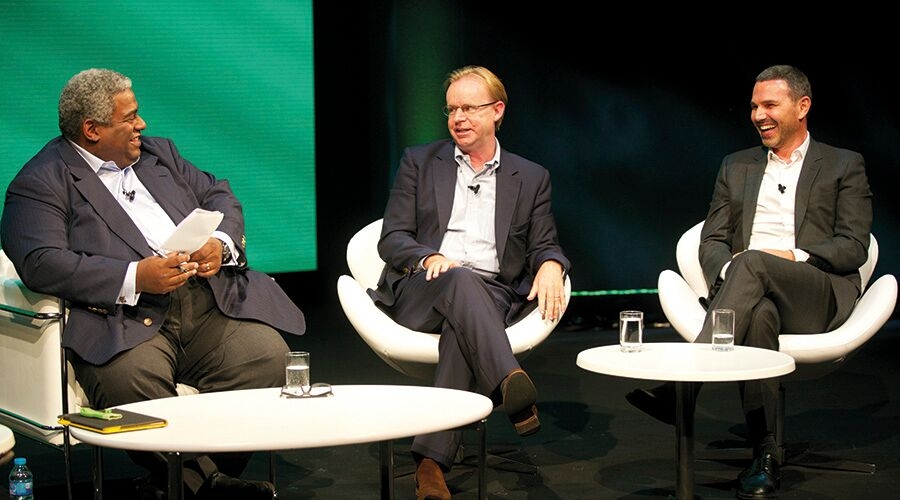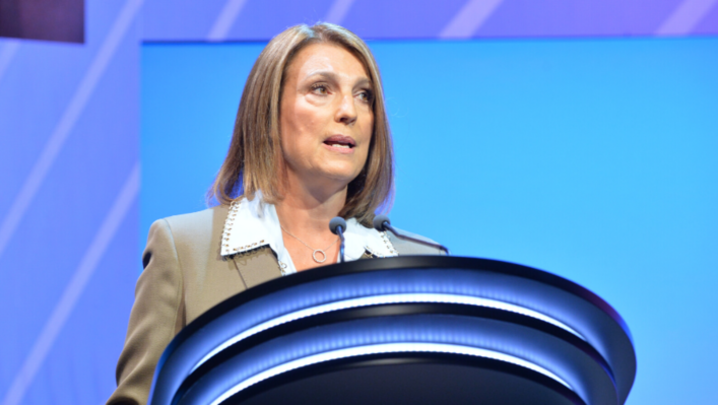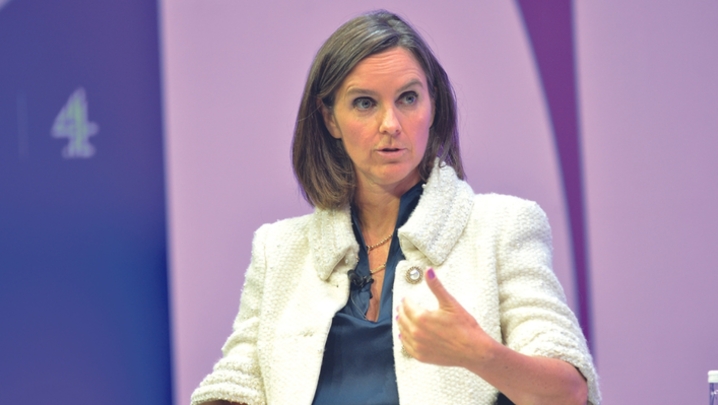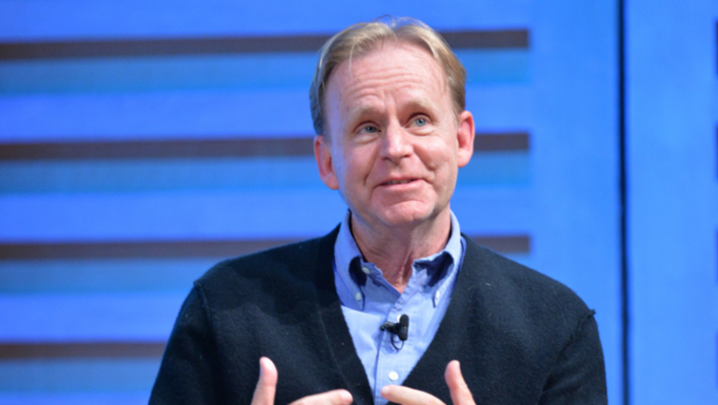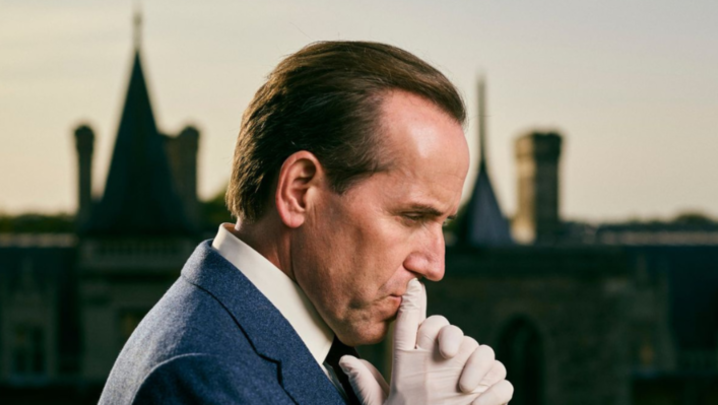Cambridge Convention 2015 Session Eight: Four very different studio bosses are challenged by Pat Younge, former head of BBC Production, to explain their working methods
This debate directed a timely spotlight on the different models of running television studios in the UK and the US – the pros and cons of growing by acquisition or organically, and the issue of how to ensure studios are successful, both financially and as creative hubs.
The panel had an added piquancy, thanks to the inclusion of Peter Salmon, recently appointed Director of the newly formed BBC Studios, an apparently opaque entity, the sheer size of which could make it an industry game changer.
All3Media’s Jane Turton outlined the “highly federal business model of running the 20 independent companies” that comprise her company. Although it is now owned by Discovery Communications (whose CEO, David Zaslav, had described All3 as an “IP farm” in the preceding session) and Liberty Media, creative autonomy remained crucial to its success, she said.
“I’d love to pretend that I had something to do with the development of Gogglebox. I didn’t, but Stephen Lambert and his business did. We employ people who are entrepreneurial. We make no apology for the fact that we are running a business. We don’t slavishly follow profit – far from it – but profit is an important part of our world.”
Quizzed on the benefits of federalism, she explained: “They are left to get on with their jobs. That’s what they want to do. To our mind, there is absolutely no point in someone in the centre second guessing the creative development production process. The [producers] are brilliantly good at doing it.”
But she bridled at the suggestion from chair Pat Younge that the central team she runs might be seen as just an overhead. “Support, strategy, we do some unexciting things, such as IT and HR, but we do far more than that,” countered Turton. “We are creative, helping to acquire and start up the new entities.”
Salmon said that, in his task of creating BBC Studios, it was important to preserve core BBC values, high standards and traditions across the widest range of genres. The well-established production bases in Bristol, Belfast, Glasgow, Greater Manchester, Cardiff and Birmingham offered “a unique creative footprint, across the UK. We are just about the only programme-making body working for one broadcaster. That is a strength.”
He confirmed that children’s television production would remain outside of BBC Studios, which will become part of commercial unit BBC Worldwide. Children’s “is an absolutely unique part of the BBC. The BBC commissions 95% of all original children’s production. It has got to move into a new on-demand world pretty sharpish.”
Traditional strengths, led by “factual programming (including science and natural history) is going to be at the heart of what we do.… There is a real virtue in holding on to as much depth and range. Where did Top Gear come from? From the factual features department in Birmingham.”
As for generating hits, he said: “We want to create the big new entertainment [format] from in-house. We are competitive. I’m so proud of Strictly. That’s the perfect virtuous circle. Strictly feeds into BBC Worldwide and back into the BBC’s kitty.”
Kevin Lygo suggested that ITV Studios was, “in a way, a blend of what Peter and Jane are talking about. We were born out of this huge production base designed to serve ITV in all its manifestations.”
Over the past four years, the focus had been “on getting our act in order here in the UK” as a place that encourages producers to come and work.
Younge pressed him on how much of an inside track he had.
Lygo replied: “Look, it feels like a battle, it doesn’t feel like we are slipped commissions under the table. The production base had been run down. So we hired more, and better, people, and started to build up the three main areas we are in: scripted, factual and entertainment.”
ITV Studios now supplies 60% of ITV’s schedule, and will hit 50% of drama, a slower build, next year. “The organic growth, if you remove the acquisitions, is substantial,” said Lygo.
“Internationally,” he added, “we have taken a big step into America, where we decided to concentrate and invest. We were impatient to [grow and expand] quickly and we acquired a number of production companies. We could see lots of production companies available at all different sizes.
“We’re in that interesting phase. Jane is ahead of us by 10 to 15 years. We are doing the federal thing. We bought these companies because they are very good. So, at first, we left them alone. It is only now, halfway through this process, that we are shaping what the business is going to look like in a few years’ time.”
He continued: “In America, you really do have to have proper relationships with buyers, networks. Buy a company that does, and then, through them, you can get into that relationship.”
Younge challenged Lygo about the risk that ITV would face when earn-out deals end at its production subsidiaries. Could ITV end up with a mere shell? “Yes, I think that’s the job, to manage what we do properly. It is different in the US to here: you have to work on succession plans early, jointly with the people. If you ask producers what they would really like, it’s: ‘I just want to get my show on air.’
“An advantage is that we have the ITV suite of channels, which we should be using more effectively.… We should give them access. I’d hate to look back in a few years’ time and think we really missed an opportunity there of developing our own IP.”
For NBCUniversal’s Michael Edelstein, running a boutique, English-language studio based in the UK, the focus is on creating the best English-language content outside of the US.
While he operates strategically, he said that he and his team were very hands-on, creatively. “I come from Los Angeles, and I always found that my studio partners [when making shows such as Desperate Housewives] could be very helpful.
“So we get involved in projects, sometimes from the very beginning, sometimes mid-way. Our goal [is that] every time we touch the content, we help.”
He gave a specific example of where his US experience had been harnessed: the new comedy-drama You, Me and the Apocalypse, premiering on Sky this autumn. The show is expected to perform well internationally.
“In the case of Downton Abbey, we set a strategy to distribute it around the world”, drawing on the company’s 17 distribution offices, which primarily sell English-language content.
Edelstein added: “What’s happening now, with globalisation, is that you need to make scripted shows that are distinctive.… And part of that is because there is so much. Scripted is no longer competing with what is on the air that night, it is competing against the greatest series of all time, which are relatively available at the touch of a button. That’s the challenge.”
The panellists were: Michael Edelstein, President, NBCUniversal International Studios; Kevin Lygo, Managing Director, ITV Studios; Peter Salmon, Director, BBC Studios; and Jane Turton, CEO, All3Media. The session was chaired by Patrick Younge, Partner and co-founder, Sugar Films, and produced by Dan Brooke.
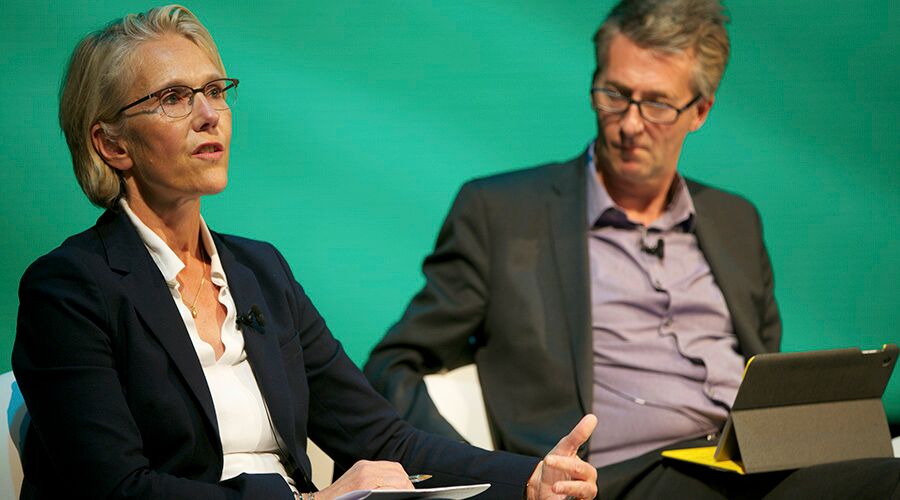
Is BBC Studios all about cash?
Peter Salmon: ‘I think it is about liberation. I genuinely think that the [BBC production] business has remained pretty static. I don’t mean in terms of ideas or creativity, but in the way it has been run. Its structure and organisation still feels like a top-down organisation [of] 20 to 30 years ago.
‘The analogy I would use is: we’ve lived with our parents for a long time, and there is a world of opportunity. We need to move out. We don’t want to be far away, initially. [We’ll] move into the basement flat, have our own front-door key – and then we just need to move around the corner.
‘Do what some of our siblings are doing, take our shirts off at parties from time to time, have a few drinks, stay out, explore the world a bit. I just think that we need to have a bit more fun. The world has changed. I don’t think we have changed enough.’
The American way of working
Jane Turton: They move faster – that’s good. They ask lots and lots and lots of questions – we try to insulate our creatives from it!
‘You take it that this is just what you do in America. You don’t take it as a criticism, it is part of the job. They are properly supportive.
‘We look [ahead] five years now. We used to look just 12 months [when owned by venture capitalists]. It is a radical difference in the way you plan your business.’
Michael Edelstein: ‘It’s tricky, I certainly underestimated the fact that we speak two very different languages. Being an American, you have to learn to speak softer.
‘We have to learn that we are not going to change a culture overnight. Americans ask a lot of questions. Learning to listen is really an important part for anyone doing business overseas.’
Question & answer
Q Jake Kanter, Broadcast: ITV has significant reservations about this big new beast [BBC Studios] in the market. What does Tony Hall have to say to calm your fears?
A Jane Turton: I’d love to have as level a playing field as possible and an opportunity to bid for some of those lovely BBC shows.
A Kevin Lygo: Well, it is a wonderful organisation. But we haven’t seen a lot of detail yet. Competition is only good. I just don’t understand quite what it is going to be.
Q Laura Mansfield, Chair of Pact Council: How important is the continuation of the terms of trade for the UK’s production ecosystem?
A Jane Turton: It’s a very good thing.
A Peter Salmon: The independent sector is pretty fantastic and there is a huge amount we have to emulate in terms of speed to market and distribution. We want to be a thriving BBC Studios alongside a booming British independent sector, too.
A Kevin Lygo: They are fine. There is going to be another review – yippee, we haven’t had one of those for 15 minutes.
A Michael Edelstein: Terms of trade are extremely important. They get more and more people into the business, setting up their own companies. I think that’s what makes this environment so unique. People who have a dream, risk a bit to fulfil that dream… It must be protected.
Q Mary Ann Halford, Senior Managing Director, FTI Consulting: What about the reverse: the effect of you [the British] impacting on us in the US?
A Michael Edelstein: When I first came here, in 2010, it was a world of 22 episodes of television in the US. It is very hard to maintain quality. Certainly, the British have been able to make six or eight really well-crafted episodes.
It has now caught on... the British authored system makes a lot of sense, creating novels for television. US networks are starting to open up to the fact, which helps us sell our content into the US.

